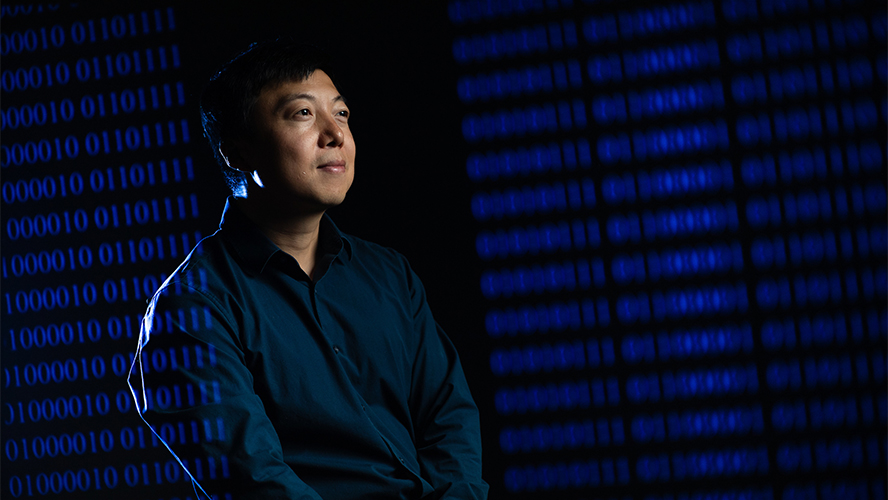
UHN has appointed Dr. Bo Wang, Scientist at Toronto General Hospital Research Institute, as Chief Artificial Intelligence (AI) Scientist. Dr. Wang, whose primary research areas are machine learning, computational biology and computer vision, will take on the pioneering role that is a first for a Canadian hospital.
His appointment builds upon the launch earlier this year of UHN’s AI Hub, a UHN Collaborative Centre for AI and Data Science and another first-of-its-kind initiative in the Canadian health care landscape.
Designed to augment human intelligence through AI health care innovation, the UHN AI Hub brings together scientists and clinicians from across UHN working in AI, including those in cancer, cardiovascular disease, neuroscience, transplant and rehabilitation.
“Health care is becoming increasingly data-driven and AI plays a pivotal role in extracting valuable insights from large datasets,” says Dr. Wang, who is also co-lead of the UHN AI Hub with Dr. Shaf Keshavjee, Chief of Clinical Innovation at UHN and Director of the Toronto Lung Transplant Program.
“AI has the potential to revolutionize health care by improving patient outcomes, increasing efficiency and reducing costs,” says Dr. Wang, who has been Lead AI Scientist at UHN’s Peter Munk Cardiac Centre since 2019. “This role offers an opportunity to drive innovation and advance patient care."
Dr. Brad Wouters, UHN’s Executive Vice President of Science and Research, says Dr. Wang’s appointment “represents the long-term commitment we are making in AI in health care at UHN and the important role it will play in achieving the organization’s goals in research, innovation and clinical care.”
Dr. Wouters says UHN is in a good position to lead this work due to the uniqueness of the vast amounts of data available here. UHN sees patients with some of the most complex cases in Canada and being located in Toronto—one of the most multicultural cities in the world—means great patient diversity.
Many UHN clinicians and researchers have already begun using forms of AI to enhance patient care. In addition to the UHN AI Hub, the Temerty Centre for AI Research and Education in Medicine at the University Toronto (U of T) is also committed to AI in health care.
“We are well positioned to create a new leadership role like this at UHN and tap into the other expertise and investments going on in Toronto,” Dr. Wouters says. “We very much want Bo’s leadership and the new UHN AI Hub Collaborative Centre to strengthen the partnerships across Toronto, across Canada and around the world.”
Dr. Wang graduated with a PhD from the Department of Computer Science at Stanford University before he was recruited to UHN. He now holds a CIFAR AI Chair at Vector Institute and is also an inaugural Temerty Professor in AI Research and Education in Medicine, and assistant professor at U of T.
Dr. Barry Rubin, Program Medical Director of the Peter Munk Cardiac Centre, had a vision to integrate machine learning, or AI, into research, education and clinical work, and with the support of the Peter and Melanie Munk Charitable Foundation created an AI team in 2019 with Dr. Wang as Lead AI Scientist.
“For us, the secret sauce was integrating computer scientists, software engineers, data scientists and clinician researchers,” Dr. Rubin says. “From a technical point of view, they do not speak the same language and have different areas of expertise, but we saw the potential for them to be complementary.
In his new role, Dr. Wang hopes to explore some of the following AI applications:
- Precision medicine – leveraging AI to analyze genomic data, clinical records and other patient-specific information to develop personalized treatment plans;
- Radiation therapy optimization – enhancing the precision and effectiveness of radiation therapy for cancer patients through AI-driven treatment planning and monitoring;
- Clinical documentation – streamlining the documentation process for health care providers by automating the generation of clinical notes and reports;
- Drug discovery – utilizing AI to predict drug interactions, identify potential drug candidates and optimize clinical trial designs;
- Patient engagement – developing AI-powered tools to empower patients in managing their health (e.g., remote monitoring).
“These are just a few examples and I am eager to collaborate with experts across UHN to explore and implement AI solutions that improve patient care and health care operations,” Dr. Wang says.
To read more, see this story in the Canadian Press.




